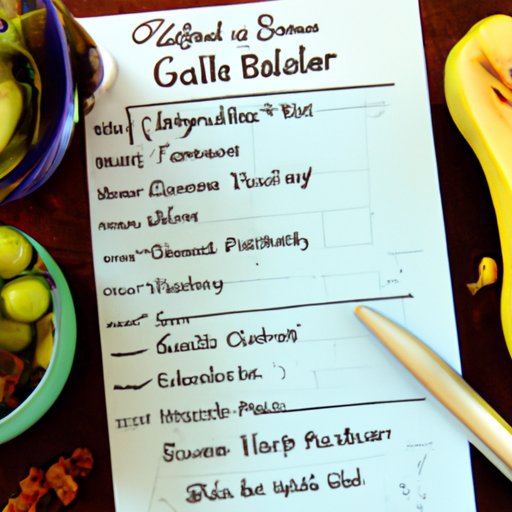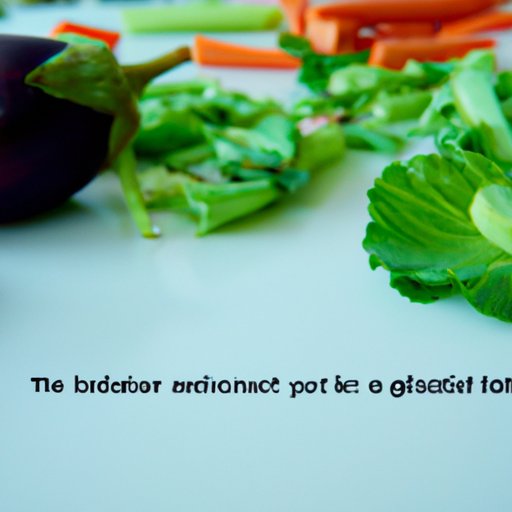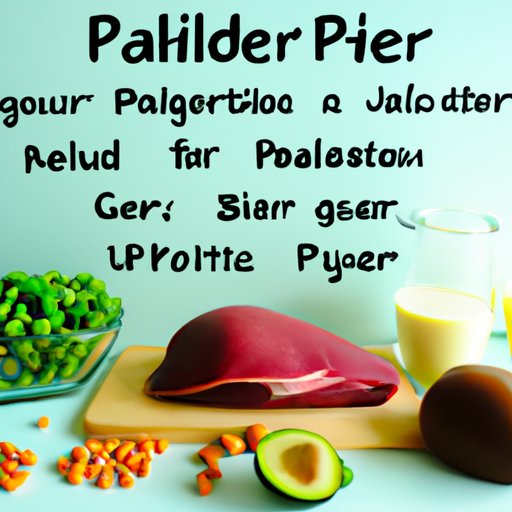Introduction
Gallbladder surgery is a common procedure used to remove the gallbladder, a small organ located underneath the liver that stores bile. The gallbladder can become inflamed or blocked due to gallstones, which can cause pain and other symptoms. After gallbladder surgery, it’s important to eat a healthy diet to help with recovery and reduce discomfort. This article will explore what to eat after gallbladder surgery and provide tips for making healthy food choices.
Exploring the Benefits of a Low-Fat Diet After Gallbladder Surgery
After gallbladder surgery, it’s important to follow a low-fat diet. According to a study published in the journal Gut, a low-fat diet can help reduce pain and other symptoms after surgery. In the study, researchers found that people who followed a low-fat diet reported fewer gastrointestinal symptoms than those who ate a higher fat diet. The low-fat diet also helped reduce the risk of developing postoperative complications.
One way to limit your fat intake is to choose lean proteins, such as fish, chicken, and tofu. Avoid fried foods and opt for grilled, baked, or steamed options instead. You should also limit your intake of high-fat dairy products, such as butter, cheese, and whole milk. Instead, opt for lower fat alternatives such as skimmed milk and low-fat yogurt. Additionally, you should avoid processed foods and snacks, as these are often high in fat and sugar.

Creating an Eating Plan That Works for You After Gallbladder Surgery
Creating an eating plan that works for you after gallbladder surgery is key to helping you feel better. Start by making sure you’re getting enough calories and nutrients. You can do this by eating a variety of nutritious foods, including fruits, vegetables, whole grains, lean proteins, and healthy fats. Aim to include at least five servings of fruits and vegetables per day, and focus on whole grains such as oatmeal, quinoa, and brown rice.
It’s also important to drink plenty of fluids, such as water and unsweetened tea and coffee. Staying hydrated can help reduce constipation, which is a common side effect of gallbladder surgery. Additionally, try to limit your intake of sugar, salt, and processed foods. If you’re having trouble sticking to your eating plan, consider speaking to a registered dietitian for personalized advice.

The Right Way to Incorporate Fruits and Vegetables into Your Diet After Gallbladder Surgery
Eating plenty of fruits and vegetables after gallbladder surgery can help you get the vitamins, minerals, and fiber your body needs to heal. According to the American Heart Association, fruits and vegetables are also packed with antioxidants, which can help reduce inflammation and boost your immune system. To get the most out of your produce, aim to include a variety of colors in your meals. For example, dark leafy greens like spinach and kale are packed with nutrients, while sweet potatoes are an excellent source of beta-carotene.
When it comes to preparing your produce, opt for fresh over canned or frozen whenever possible. You can also add fruits and vegetables to soups, stews, and salads, or blend them into smoothies. Additionally, try adding herbs and spices for extra flavor without adding fat or calories.

Understanding the Role of Protein in Your Diet After Gallbladder Surgery
Protein is an important part of any diet, but it’s especially important after gallbladder surgery. Protein helps repair damaged tissues and build new muscle, which is important for healing after surgery. Good sources of protein include lean meats, fish, eggs, beans, nuts, and seeds. If you’re vegetarian or vegan, you can still get enough protein from plant-based sources such as beans, lentils, tofu, tempeh, and quinoa.
To get the most out of your protein, aim to include a variety of sources in your diet. For example, you could have eggs for breakfast, a salad with beans and nuts for lunch, and salmon for dinner. Additionally, make sure you’re getting enough calories to meet your energy needs. Protein is also important for maintaining muscle mass, so make sure you’re getting enough protein to support your muscles.
Making Healthy Choices When Eating Out After Gallbladder Surgery
Eating out after gallbladder surgery can be challenging, but there are ways to make healthier choices. When ordering, ask for the dish to be prepared with little or no added fat or oil. Additionally, opt for grilled, baked, or steamed dishes instead of fried ones. You can also ask for dressings and sauces to be served on the side so you can control how much you use.
When selecting sides, opt for vegetables or a salad instead of fries or mashed potatoes. Additionally, watch out for hidden sources of fat, such as mayonnaise, bacon, and cheese. Finally, avoid sugary drinks and desserts, and opt for water or unsweetened tea instead.
Conclusion
Eating well after gallbladder surgery is essential for a successful recovery. A low-fat diet can help reduce discomfort, while increasing your intake of fruits and vegetables can provide essential vitamins and minerals. Additionally, make sure you’re getting enough protein to support your muscles. Finally, when eating out, opt for grilled, baked, or steamed dishes and avoid hidden sources of fat and sugar.
By following these tips, you can ensure you’re getting the nutrition you need to recover from gallbladder surgery. Eating well can help reduce discomfort and speed up your recovery, so make sure you’re taking care of your body and making healthy food choices.
(Note: Is this article not meeting your expectations? Do you have knowledge or insights to share? Unlock new opportunities and expand your reach by joining our authors team. Click Registration to join us and share your expertise with our readers.)
